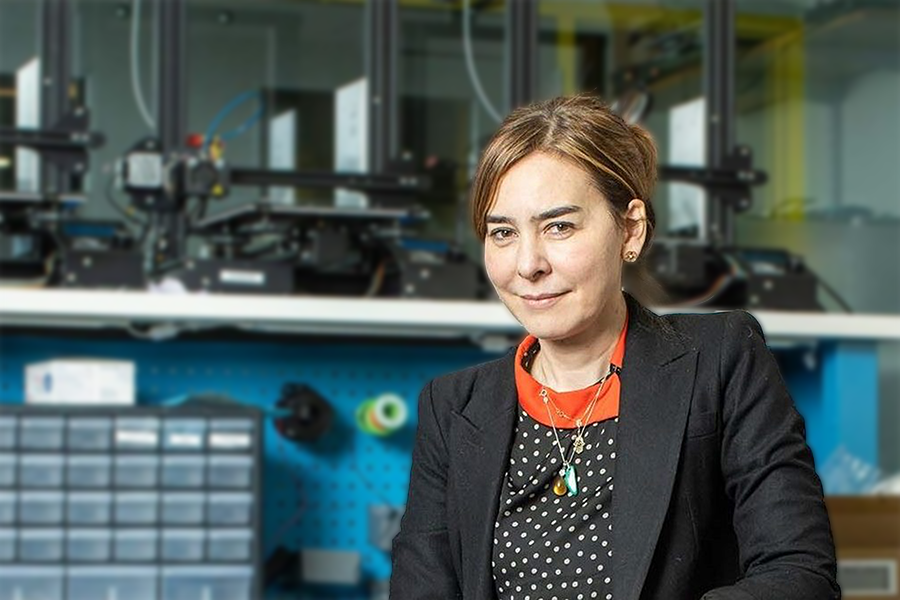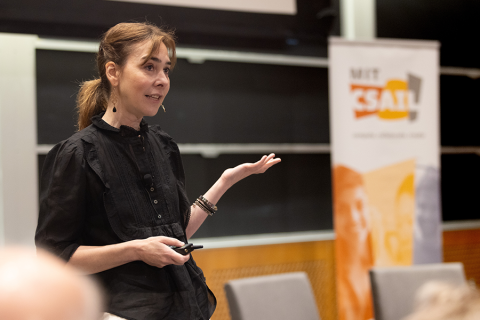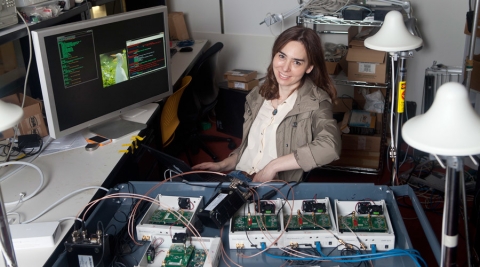Dina Katabi, MIT EECS Thuan and Nicole Pham Professor and CSAIL principal investigator, has received the 2026 IEEE Koji Kobayashi Computers and Communications Award for her impact on wireless and network communication, including wireless sensing.
Katabi, the director of the MIT Center for Wireless Networks and Mobile Computing, has made key contributions to the field of wireless data transmission by improving the data rate and reliability of WiFi and cellular systems. Her mechanisms help overcome the dreaded dead spots you might encounter in situations like losing cell service, or perhaps the interference two people speaking via radio may experience. Katabi’s wireless systems navigate these disruptions in communication using advanced mathematical models that can move data between points more efficiently.
Her catalog of projects includes devices that can “see behind walls” and smart sensors that can track people’s movements. She also co-developed the Sparse Fourier Transform — an algorithm that can separate signals into individual frequencies up to 100 times faster than the Fast Fourier Transform to solve problems in fields such as computer networks, medical imaging, and biochemistry.
More recently, Katabi has focused on designing wireless devices that assist with digital health using AI and radio signals. For example, she recently helped reveal that AI models used to predict a patient’s race, gender, and age may use those traits as shortcuts when making medical diagnoses. Katabi has also developed an AI system that can detect Parkinson’s from breathing patterns and an in-home wireless device that tracks the progression of that disease via a neural network that evaluates its presence and severity.
Katabi’s other research interests include congestion control, scalability and robustness of communication systems, routing, content distribution, peer-to-peer systems, differentiated services, Internet pricing, and network measurement and security, particularly in adapting tools from applied mathematics such as control theory, coding theory, and AI to solve problems in computer networks. She is also a principal investigator at the Abdul Latif Jameel Clinic for Machine Learning in Health (Jameel Clinic) and a co-founder of Emerald Innovations.
The IEEE Koji Kobayashi Computers and Communications Award is recognition of scientists like Katabi who make “contributions to the integration of computers and communications” that’s been handed out annually since 1988. Katabi has also earned the SIGCOMM Lifetime Achievement Award, the 2013 MacArthur “genius grant” Fellowship, the Association for Computing Machinery (ACM) Prize in Computing in 2018, the ACM Grace Murray Hopper Award, three ACM Test-of-Time Awards, and a Sloan Research Fellowship.
In 2023, Forbes named Katabi one of the world’s most influential women engineers while the Association for Computing Machinery has called her “one of the most innovative researchers in the field of networking.” She is a member of the American Academy of Arts and Sciences, the National Academy of Engineering, and the National Academy of Sciences.



